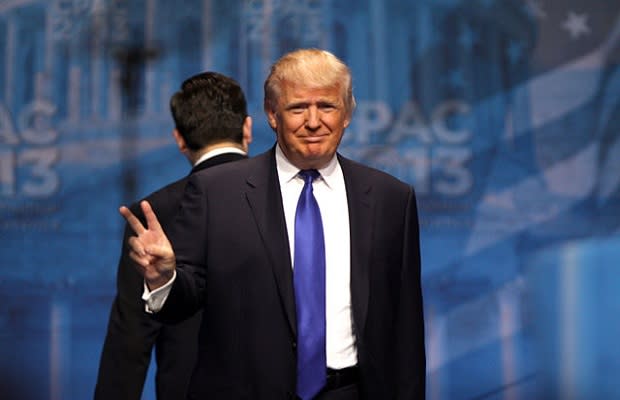Trump’s impact on the global markets: talking tough…but pragmatism will reign

‘Speak softly and carry a big stick; you will go far’ – Theodore Roosevelt
So it is the Donald’s inauguration day as I write. It would be bad manners not to offer my congratulations and best wishes for a successful and well-respected Presidency.

In the pantheon of great Presidents over the last couple of centuries of so most commentators would include Theodore Roosevelt (US President 1901-1909). Above, I included one of his more famous comments which he uttered in a descriptive comment about the driving forces behind US foreign policy in the early part of the 20th Century.
The upcoming politics of 20 January and beyond is going to radically change and evolve compared to the administration of Barrack Obama. In terms of foreign policy interactions, President Trump appears likely to adopt a tactic of talking tough and acting pragmatically.

Whilst this tactic may have Theodore Roosevelt spinning in his grave it is probably the best Donald Trump can do…and it can be surprisingly effective.
The Trump Presidency is highly likely to be a pragmatic commercial business administration rather than one centred on the ideals and ways of professional politicians – a structure which apes the skill sets of the business experience savvy group he has clustered around him.
The first rule of business negotiation is to talk tough with the expectation of pushing up the ultimate contract price or sales level. ‘Building a consensus’ like professional politicians are taught to achieve via quiet discussions at conferences organised by supranational institutions typically has little place in the early stages of business building…and certainly not in the experience of Donald Trump.
So this is why all the talking heads at the World Economic Forum conference at Davos and at a conference I attended earlier this week in Hong Kong, are super worried about Donald Trump straining current diplomatic norms.
[graphiq id=”kwCk5wa5yRf” title=”Trade as a Percent of GDP by Country” width=”600″ height=”591″ url=”https://w.graphiq.com/w/kwCk5wa5yRf” link=”http://country-facts.findthedata.com” link_text=”FindTheData | Graphiq” ]
And given the only way to stand up to a hard-talking bully is to stand your ground you can see why protectionism fears are rising. Let’s not forget that greater impediments to global free trade are typically a lose-lose over a reasonable time period for everyone. Do we really need to drag up the examples of the two Germanys or the two Koreas again?
But there is hope. A commercial centred approach is always fairly pragmatic because that is the nature of business…especially if you know the reality is that you have a bit of a weak hand. Donald Trump knows the funding of US debt is his economic Achilles heel.
For reasons of trying to stimulate domestic US growth and jobs, Donald Trump will want to spend some money via tax cuts and enhanced infrastructure spend.
Great debate still continues whether this ultimately will create buoyant economic conditions that will turn trade and budget deficits into surpluses but short term they will need financing.
Now as any A-Level Economics student will tell you higher deficits need higher rates of interest to stimulate the required Treasury bond sales and hence we have duly seen bond yields pop up noticeably in the US as well as a number of other countries around the world.
Now in the US specifically this hurts the typical mortgage rate charged to US households that are borrowing money to fund house purchases…just the type of ordinary voter that Donald Trump appealed to a few months ago.
And who does America sell a lot of Treasury bonds to globally? Well the top holder now is their ally Japan who continue to go through a sustained crab-like sideways movement in their own domestic economy hence a solid yielding dollar-based investment will continue to be an attraction. However it is the other big holder that investors should be worried about.
[graphiq id=”8voT2hZW3WJ” title=”Demographic Comparison of Initial Cabinet Selections” width=”640″ height=”895″ url=”https://w.graphiq.com/w/8voT2hZW3WJ” link=”https://www.graphiq.com” link_text=”InsideGov | Graphiq” ]
China has recently been selling some Treasury bonds. Some say this is to help quell recent outflows from their own economy, others that it is a decidedly political move that quietly and progressively lumps more pressure on the new President…who maybe is big talk and provocative tweets but who is carrying a much smaller stick than people perceive. Note how Mr Trump has talked in recent days about a too strong dollar which if it did ease would help out China nicely too at a time they need some pressure relieving. Funny that.
So what does all this mean for financial markets? Volatility? Certainly as financial markets are not the cheapest and the scope for political mis-understands are clear. However, there will be some opportunity as a more-pragmatic-than-you-think Trump gets on with the business of government and all those professional worriers at conferences have to eat a bit of humble pie.
In short with relation to your investments, don’t panic and take matters as they come. I expect Trump to be a pragmatic President.
Chris Bailey has 20 years of investment industry experience at long-only and long-short institutions as a global multi-asset fund manager, strategist/macro thinker and, in the earlier part of his career, as a securities and fund analyst.
In 2013 he founded Financial Orbit focusing on daily macroeconomic comment and securities analysis. In December 2016 his Twitter account (@financial_orbit) was named as one of the ’50 accounts investors should follow in 2017’.
The content on this page does not constitute financial advice and is provided for general information purposes only. Nothing on this page should be regarded as an offer to conduct investment business or to buy/sell any investment

 Yahoo News
Yahoo News 

